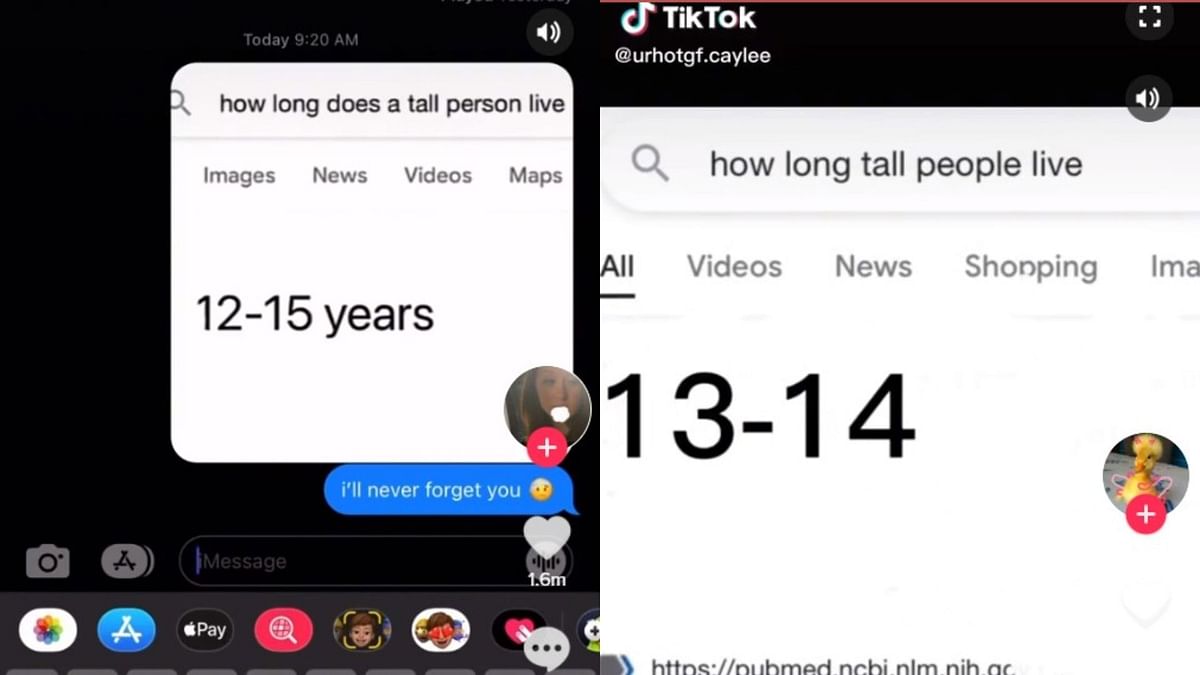Have you ever stumbled upon a meme that just sticks with you? Like, it’s so random yet hilarious that you can’t help but wonder where it came from? Well, the "How Long Do Short People Live" meme is one of those gems. This quirky internet sensation has taken the world by storm, leaving millions laughing and scratching their heads. But what’s the story behind it? Why does it resonate so deeply with people? And is there any truth to the claims it makes? Let’s dive in and find out!
The "How Long Do Short People Live" meme isn’t just another viral joke—it’s a cultural phenomenon that’s sparking conversations about height, longevity, and the quirks of human nature. It’s the kind of meme that makes you pause and think, “Wait, is this real?” Spoiler alert: it’s mostly humor, but we’ll break down the science behind it later. So, buckle up because we’re about to take a deep dive into the world of short people, memes, and everything in between.
Before we get into the nitty-gritty, let’s address the elephant in the room: why are we so fascinated by this meme? Is it because we love poking fun at ourselves? Or is it because we’re secretly curious about the science behind height and lifespan? Whatever the reason, one thing’s for sure—this meme is here to stay. So, let’s explore why it’s so popular, what it means, and whether there’s any truth to the claims it makes.
Read also:How To Ace The Real World The Ultimate Guide For Thriving In Life
What’s the Deal With the "How Long Do Short People Live" Meme?
Alright, let’s start with the basics. The "How Long Do Short People Live" meme is a play on words that humorously suggests short people live longer than tall people. It’s often accompanied by a picture of a short person with a caption like, “I’m short, so I get extra years,” or “Short people don’t die.” The humor lies in its absurdity—of course, height doesn’t directly determine how long someone lives, right? Or does it?
What makes this meme so relatable is its universal appeal. Whether you’re tall, short, or somewhere in between, you can’t help but chuckle at the idea that height might somehow influence lifespan. It’s the perfect blend of self-deprecation and curiosity, which is why it’s resonated so well with audiences worldwide.
Why Did This Meme Go Viral?
So, why did this particular meme catch fire? There are a few reasons:
- Relatability: Everyone can relate to height in some way, whether you’re the shortest person in your family or the tallest.
- Humor: The meme uses a playful tone to address a serious topic—longevity—which makes it both entertaining and thought-provoking.
- Cultural Relevance: In a world obsessed with health and wellness, the idea of height influencing lifespan taps into our collective curiosity about what factors affect longevity.
Combine all these elements, and you’ve got a recipe for viral success. But what’s really fascinating is how the meme has evolved over time. People have started creating their own versions, adding their own twists and spins, which keeps the conversation fresh and engaging.
Is There Any Truth to the Meme?
Now, here’s the million-dollar question: is there any scientific basis to the claim that short people live longer? Surprisingly, yes—there’s some evidence to suggest that height might play a role in lifespan, but it’s not as straightforward as the meme makes it seem.
Studies have shown that shorter people tend to have lower rates of certain diseases, such as heart disease and cancer, compared to taller individuals. This could be due to a variety of factors, including genetics, metabolism, and even lifestyle choices. However, it’s important to note that height is just one of many factors that contribute to longevity. Other factors, such as diet, exercise, and healthcare access, play a much bigger role.
Read also:Is Hasan Dating Valkyrae The Ultimate Guide To Their Relationship Rumors
The Science Behind Height and Longevity
Let’s break it down further. Research has found that shorter individuals may have:
- Lower Insulin Levels: Shorter people tend to have lower insulin levels, which can reduce the risk of diabetes and other metabolic disorders.
- Stronger Immune Systems: Some studies suggest that shorter people may have more robust immune systems, making them less susceptible to certain illnesses.
- Slower Cell Division: Taller people have more cells in their bodies, which means there’s a higher chance of mutations that could lead to cancer. Shorter people, on the other hand, have fewer cells, potentially reducing their cancer risk.
Of course, correlation doesn’t equal causation. Just because shorter people might have a slight advantage in certain areas doesn’t mean they’ll automatically live longer. It’s all about balance—genetics, environment, and lifestyle choices all play a role in determining how long someone lives.
Height Stereotypes and the Meme
Now, let’s talk about the elephant in the room: height stereotypes. The "How Long Do Short People Live" meme plays into the idea that short people are somehow disadvantaged in life, but this isn’t necessarily true. In fact, many short individuals thrive in various fields, from business to sports to entertainment.
However, the meme does highlight some of the challenges that short people face in society. For example, shorter individuals might struggle with things like reaching high shelves, navigating public spaces designed for taller people, or even dealing with societal biases. But hey, who needs tall when you’ve got personality, right?
Breaking Down Height Bias
Height bias, or “heightism,” is a real thing. Studies have shown that taller people are often perceived as more authoritative, intelligent, and successful than their shorter counterparts. This bias can affect everything from job opportunities to romantic relationships. But the good news is that awareness is growing, and more people are starting to recognize the value of diversity in all its forms—including height.
So, while the "How Long Do Short People Live" meme might seem like just another joke, it also serves as a reminder that we shouldn’t judge others based on their physical characteristics. After all, height is just one small part of who we are—it doesn’t define our worth or potential.
Short People in Pop Culture
Speaking of height, let’s take a moment to appreciate some of the amazing short people who’ve made a big impact in pop culture. From actors to musicians to athletes, these individuals have proven that height is no barrier to success.
Notable Short People in Entertainment
Here are just a few examples:
- Danny DeVito: Standing at just 5’0”, DeVito has become one of Hollywood’s most beloved actors, starring in hits like "Taxi" and "Batman Returns."
- Veronica Falcon: This Mexican actress and singer is a household name in Latin America, despite being only 4’11”.
- Tom Verlaine: The lead singer of the band Television, Verlaine was known for his poetic lyrics and distinctive voice, all while standing at just 5’4”.
These individuals prove that talent and charisma can overcome any perceived limitations. So, the next time someone tells you that height matters, just point to these legends and say, “Speak for yourself.”
How to Embrace Your Height
Whether you’re tall, short, or somewhere in between, it’s important to embrace who you are. Here are a few tips for loving your height:
- Focus on Your Strengths: Instead of dwelling on what you perceive as weaknesses, focus on the things that make you unique and special.
- Surround Yourself With Positivity: Spend time with people who appreciate you for who you are, not how tall you are.
- Stand Tall (Literally): Good posture can make a big difference in how you feel about yourself, no matter your height.
Remember, height is just one small part of who you are. Don’t let it define you—instead, let it be one of the many things that make you special.
The Future of Height and Longevity Research
As science continues to evolve, we’re learning more and more about the complex relationship between height and longevity. Researchers are exploring everything from genetics to lifestyle factors to better understand how these variables interact. While we may never have all the answers, one thing’s for sure: the conversation isn’t going anywhere anytime soon.
In the meantime, memes like "How Long Do Short People Live" will continue to entertain and educate us. They remind us to take life with a grain of salt and to appreciate the quirks that make us who we are.
What Can We Learn From This Meme?
The "How Long Do Short People Live" meme teaches us a valuable lesson: humor can be a powerful tool for breaking down barriers and starting conversations. By laughing at ourselves and our perceived differences, we can create a more inclusive and understanding world.
So, the next time you see this meme, don’t just scroll past it—take a moment to reflect on what it means. Who knows? You might just learn something new about yourself and the world around you.
Conclusion: The Last Laugh Goes to Short People
In conclusion, the "How Long Do Short People Live" meme is more than just a funny joke—it’s a cultural phenomenon that’s sparking conversations about height, longevity, and self-acceptance. While there may be some scientific basis to the claim that shorter people live longer, it’s important to remember that height is just one of many factors that contribute to lifespan.
So, whether you’re tall, short, or somewhere in between, embrace who you are and don’t let societal norms dictate your worth. And if you’re feeling inspired, share this article with your friends and family to keep the conversation going. Who knows? You might just start a movement!
Table of Contents:
- How Long Do Short People Live For Meme: A Deep Dive Into the Viral Phenomenon
- What’s the Deal With the "How Long Do Short People Live" Meme?
- Why Did This Meme Go Viral?
- Is There Any Truth to the Meme?
- The Science Behind Height and Longevity
- Height Stereotypes and the Meme
- Breaking Down Height Bias
- Short People in Pop Culture
- Notable Short People in Entertainment
- How to Embrace Your Height
- The Future of Height and Longevity Research
- What Can We Learn From This Meme?
- Conclusion: The Last Laugh Goes to Short People


